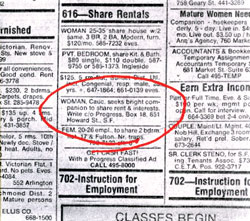
In a city where so many strangers share cramped quarters, is discrimination ever justified in hunting for a roommate? That’s the question before a federal appeals court in Pasadena, Calif., and real estate insiders say the court’s decision could affect how roommate listings operate here.
The case dates back to 2003, when two branches of the nonprofit Fair Housing Council sued the classifieds website Roommate.com over features that, among other things, required users to disclose their gender, sexual orientation and family status. The site then let users filter roommates based on the same traits, which are protected by 1968’s Federal Fair Housing Act or, in the case of sexual preference, by California’s housing law.
In early 2009, a Los Angeles Federal court ruled that the Fair Housing Act — which has expanded to protect gender and family status but is silent on shared accommodations — “unambiguously applies ” to living arrangements like the ones advertised on Roommate .com. The company appealed. The U.S. Court of Appeals for the Ninth Circuit heard oral arguments in July, so a ruling in the case could come down anytime.
Roommate.com, which is based in Scottsdale, Ariz., garnered about 1 million new postings annually when the suit was filed, though that has since dropped off, according to Mike Peters, the site’s head of business development. About 3,700 of its current users are in New York state, mostly in New York City, he said.
The company claims that fair housing law was never intended to regulate whether a woman wants to weed out male roommates, or a Jewish user wants to screen roommates who don’t keep kosher.
“You’re making that decision based on a whole host of things, including personality fit, whether you have similar lifestyles, whether you have pets, ” said Timothy Alger, the attorney representing Roommate.com.
The Fair Housing Council, however, said the site’s features are tantamount to discrimination. When the group created test profiles, gay men ended up with fewer roommates to choose from than others because of user preferences, according to the council’s attorney, Elizabeth Brancart.
“You could certainly see that a filter like that could be incredibly offensive, ” said Michael Greenberg, CEO of the Manhattan brokerage Level Group. “At the same time, people choose to live with whoever they want to live with. ”
The Fair Housing Act appears to be designed to prevent widespread discrimination, attorneys said, not extend landlord-like obligations to people seeking roommates. Still, it’s notoriously difficult to predict the outcome and scope of appellate decisions.
Aaron Shmulewitz, an attorney at Belkin Burden Wenig & Goldman who represents co-op and condominium boards, said courts generally seek to broaden laws that aim to remedy discrimination.
“It would not surprise me if a court extended [the Fair Housing Act] to cover roommate situations so as to prevent housing discrimination,” he said.
The Ninth Circuit’s opinion will not be binding in New York, so a local court could rule differently on a similar case. But the decision will provide guidance for New York judges, attorneys said, and it could impact roommate advertising here, from Craigslist to newspaper classifieds.
In the world of online apartment listings, it’s difficult to create an easy-to-use website without requiring users to answer questions that potentially violate housing laws, said David Vivero, CEO of San Francisco-based online rental management firm RentJuice, which launched in New York this year.
If the Ninth Circuit affirms the lower court in the Roommate.com case, online listings services will have to strengthen disclaimers about user content, and potentially change their interfaces to protect against institutionalized discrimination, he said.
Roommate.com has already scrapped some of the features at issue in the case, which Peters partly blamed for the drop in users. The fact that “we just can’t come right out and ask the questions ” makes it more difficult to match people, he said.
Craigslist already prohibits most housing ads that state discriminatory preferences. (A representative for Craigslist did not immediately return a request for comment.)
Whatever the outcome of the case, industry insiders said, New Yorkers are unlikely to stop excluding specific categories of people when renting out extra rooms.
“I’d prefer everybody just saw rainbows and unicorns, and not race, ” said Jeff Orlick, cofounder of Roommates Wanted NYC, a group that organizes live roommate meet-ups. “But it’s the reality of it, and I don’t think it’s going to change. ”